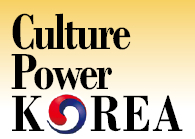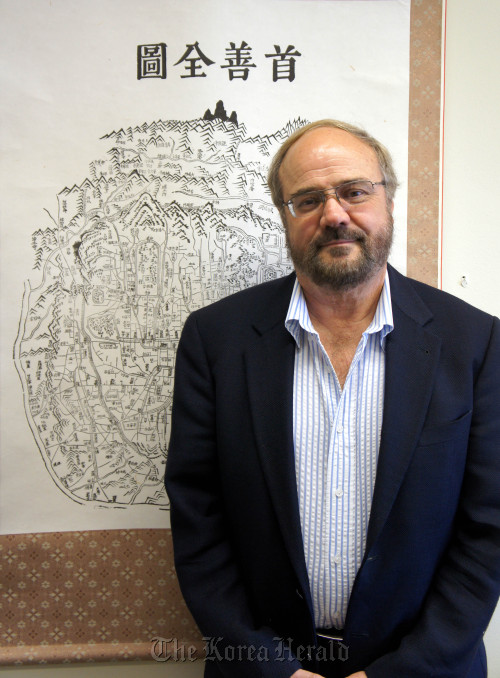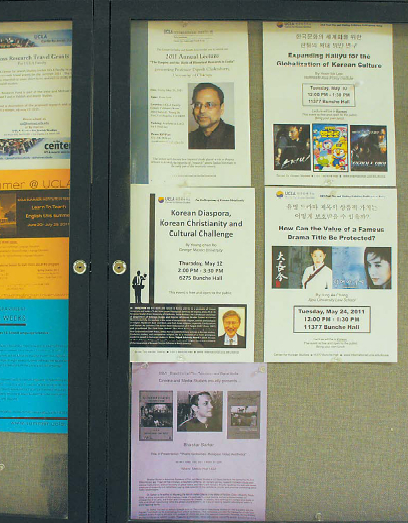UCLA prof. John Duncan says globalizing Korean Studies is key task for scholars outside peninsula
LOS ANGELES ― What is the point of telling John Smith in small town America that Korea is the fount of Japanese civilization?
This was the question posed by John Duncan, director of the UCLA Center for Korean Studies.

“I think it is really important to let the world know the strengths of your culture. One thing that makes it problematic is that there is awful lot of competition between China and Japan and Korea. Rather than going around telling everybody that Japan got all its higher culture from Korea, just tell them what is good about Korea. You can show them Hangeul, cheongja (celadon), Joseon period paintings, then they would say, ‘Wow, Koreans have done some pretty neat stuff,’” Duncan told The Korea Herald.
LOS ANGELES ― What is the point of telling John Smith in small town America that Korea is the fount of Japanese civilization?
This was the question posed by John Duncan, director of the UCLA Center for Korean Studies.

“I think it is really important to let the world know the strengths of your culture. One thing that makes it problematic is that there is awful lot of competition between China and Japan and Korea. Rather than going around telling everybody that Japan got all its higher culture from Korea, just tell them what is good about Korea. You can show them Hangeul, cheongja (celadon), Joseon period paintings, then they would say, ‘Wow, Koreans have done some pretty neat stuff,’” Duncan told The Korea Herald.

Duncan not only speaks Korean flawlessly and understands Koreans’ subtle sentiments but may even have more affection for the country than some natives.
Born in Arizona, Duncan came to South Korea in 1966 as a USFK soldier. Soon, the barely 20-year-old Duncan was drawn to the country where the people were so full of “injeong,” or warmth of heart. His interest naturally shifted from Latin American Studies, his major at the time, to Korean Studies and he enrolled at Korea University in Anam-dong, eastern Seoul, in 1970 after being discharged from the military.
He married a Korean woman and spent his youthful days in Seoul during its most tumultuous times ― when pro-democracy movements were at their height and economic developments going at full speed. So it did not sound awkward at all when the man with Western features explained, “My generation in Korea fought for political freedom and the younger generation now has a social freedom we didn’t have.”
He began teaching Korean Studies at UCLA in 1989 and spearheaded the center’s growth. Established in 1993, the center is the biggest of its kind in North America with 10 regular faculties, four or five lecturers, about 40 undergraduate majors and 50 to 55 graduate students. It has produced about 30 PhDs in the past 10 years, most of whom work at top U.S. universities and proudly call themselves the “Westwood School” after the name of the area UCLA is situated in.

“In Harvard, Columbia, University of Washington ... it is always big China, big Japan and little Korea. But here in UCLA, some of my colleagues from other Asian studies departments say that it is big Korea, little China and little Japan,” said Duncan, chuckling. He received the Korea Foundation Award in 2009 for a lifetime’s worth of contributions to Korean studies worldwide.
The interest in Korean Studies among non-Koreans has been growing rapidly: Duncan said that while about 75 percent of his students were Koreans or Korean-Americans 20 years ago, now they take up only about 40 percent.
“Korea’s continued economic growth is part of the reason and Korea’s popular culture, like hallyu, is another. Not only from Korean-Americans but I hear about it from Chinese-Americans and Filipino-Americans. These people are all watching Korean soap operas,” said Duncan.
While Japan has been actively engaged in promoting its culture overseas since the second half of the 19th century, Duncan said that Korea was very late in starting to promote its culture.
“But it is making progress, having more people come to appreciate the sophistication of Korean culture. Some things seem to be quite effective. Like the Korean Cultural Center which offers Korean language courses at very reasonable prices and lots of people take those. There are also lots of events which draw quite a lot of people,” he said.
“Korea is a small country that has been existing thousands of years next to a very powerful country. China absorbed almost all of its neighbors and yet it did not absorb Korea. Why not? Because Koreans maintained a very distinctive sense of ‘self’ throughout their history. I think there is an important thing for us to learn in this age of globalization because lot of questions in this age are how people maintain their identity. I can say that in the case of Korea it is possible. It can be done.”
Duncan has been doing his part to inform the U.S. public about Korea. A project to include more and better mentions of Korea in U.S. textbooks is one example.
“Typically in the old high school textbooks, the only time Korea would be mentioned was the Korean War. We have been explaining to the state authorities in education about the current and historical importance of Korea, the importance of Korean economy, its high-tech achievements in geumsokhwalja (metal type), Buddhist philosophy, Confucian philosophy, ceramics and painting,” he said.
On one hand, he is doing it for Koreans living in the U.S. so that they can get more respect from non-Korean-Americans. On the other, it is also for the general U.S. public to get a better understanding of Korea, particularly what it has gone through over the past 150 years, said Duncan.
“The American public only hears about Korea when North Korea does something so they have a very negative image of Korea. It is important to help them understand what South Korea has achieved and the differences between South and North Korea so they can make better informed decisions about policies toward both Koreas,” said Duncan.
He is a member of the Alliance of Scholars Concerned about Korea which was formed among several Korean Studies scholars in the U.S. in 2003. Duncan explained that they spend a lot of time trying to educate politicians and the public as well as students about the situation in Korea, the results of the Korean War and most importantly, the causes of the division.
“The U.S. also played a very important role in dividing Korea in 1945 and setting up a separate government in the south in 1948 and of course U.S. still maintain troops in South Korea today so it has a certain historical responsibility in the division of Korea,” said Duncan.
He believes that the U.S. should enter into bilateral negotiations with N.K. which would eventually lead to signing of a peace treaty.
“As long as we pursue the kind of policy that we have been pursuing towards North Korea, there is not going to be any reason for them to trust us. We will not have any leverage towards them. But if we have diplomatic relationships and trade relationships, then we can get the leverage. And maybe we can help to improve the human rights problems and may lead N.K. towards a soft landing,” he said.
He also emphasized the importance of unification.
“As long as Korea remains divided then outside powers like China, Japan, Russia and the U.S. can manipulate the two Koreas. But with Korea united, then it becomes much more difficult. Korea can have more autonomous foreign policy and in long term a more autonomous process in domestic development. I realize that reunification would not be easy, it would come with many costs and probably take a long time, but it has to be done. I hope to see it before I retire,” said Duncan.
The biggest task right now for Korean Studies scholars outside of Korea, said Duncan, is the “globalization of Korean studies.“
“People who do Korean studies in Korea have one way of looking at it, those in Japan look at it a different way, in China another way, in the U.S. another way, in Europe another way … So there is an awful lot of effort going on to try to get people from other countries doing Korean studies to talk to each other and to do joint projects,” he said.
They are organizing a world wide consortium of Korean studies centers which includes about dozen universities such as Seoul National University, Yonsei University, Korea University from Seoul, UCLA from the U.S. and University of British Columbia from Canada.
“I’m not just talking about spreading Korean studies throughout the world. We are really trying to create sort of a new epistemic regime in which students and scholars from different countries can share,” said Duncan.
By Park Min-young, Korea Herald correspondent (claire@heraldcorp.com)







![[KH Explains] Hyundai's full hybrid edge to pay off amid slow transition to pure EVs](http://res.heraldm.com/phpwas/restmb_idxmake.php?idx=644&simg=/content/image/2024/04/18/20240418050645_0.jpg&u=20240419100350)






![[From the Scene] Monks, Buddhists hail return of remains of Buddhas](http://res.heraldm.com/phpwas/restmb_idxmake.php?idx=652&simg=/content/image/2024/04/19/20240419050617_0.jpg&u=20240419175937)

![[KH Explains] Hyundai's full hybrid edge to pay off amid slow transition to pure EVs](http://res.heraldm.com/phpwas/restmb_idxmake.php?idx=652&simg=/content/image/2024/04/18/20240418050645_0.jpg&u=20240419100350)

![[Today’s K-pop] Illit drops debut single remix](http://res.heraldm.com/phpwas/restmb_idxmake.php?idx=642&simg=/content/image/2024/04/19/20240419050612_0.jpg&u=)